#i went through the entire manga and fyodor's scenes in the movie and his scenes in the novelization AND the DA prologue in mayoi
Text
Everyone is in full conspiracy mode since (a little before) the last chapter with the Fyodor ability theories and I'm loving that. That got me thinking:
What was Fyodor's objective again?
Disclaimer, I fully rely on translations, but I cross-checked with two of them so...
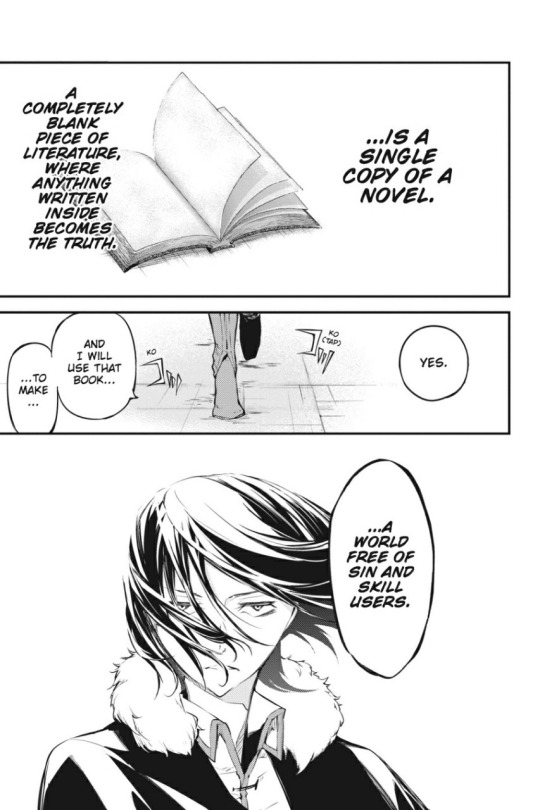
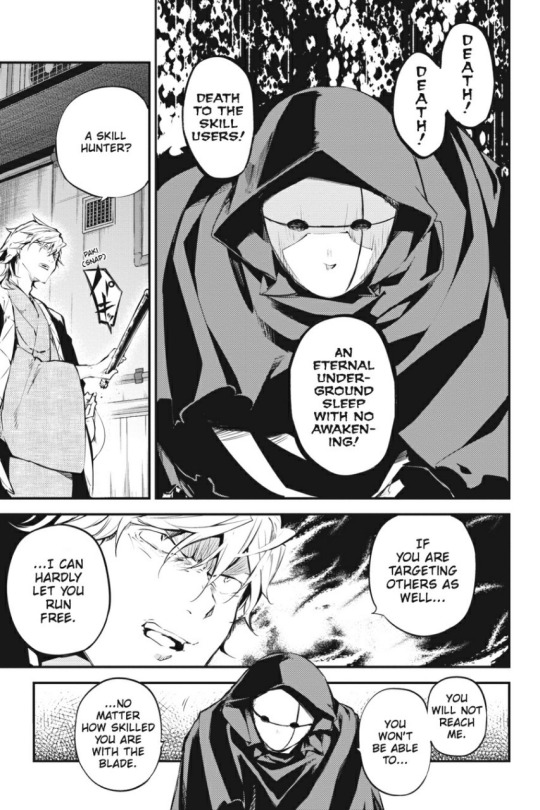
special thanks to @ticklinglady for finding these pages!
"... a world free of sin and skill users."
1. A world free of sin
He says he wants to spill the blood of the sinners like 3 times but doesn't really give an explanation of who, what or why.
His definition of "sin" is quite vague, but could be the usual christian/catholic/orthodox/etc (sorry it's been a while) stuff. The one time he identified a specific behaviour as a sin was when the Agency and Port Mafia were killing each other "even though they knew they were being set up to do so" (though he also said Ace breathing and thinking was a crime and said killing Karma was freeing him).
In the Dead Apple novelization (not written, but edited by Asagiri, who came up with the original idea for the movie and gave a whole speech on Fyodor to the writing team), Fyodor does make a speech about the post-dragon red fog surrounding the Earth, transforming it into a "dead apple" by essentially killing everyone and "washing away the original sin of man". The apple motif was a sort of poetic irony.

According to the novelization, this was his true objective at the time and he never mentions the Book, not even in the epilogue, as opposed to doing so in the movie.
This scenario is kind of a contradiction, since the fog would have erased everyone except ability users, though most would have suffered at the hands of their abilities before dying. Said abilities would have then been kept in a collection maintained by Shibusawa, an ability singularity himself, which brings us to...
2. A world free of ability users
I went through the manga and never did find an instance of Fyodor speaking ill of abilities, only ability users. That doesn't mean there is a difference to him in the first place, but it's interesting.
The Dead Apple scenario is to be taken with a grain of salt, but killing everyone doesn't seem to be a problem for him (he kills nearly everyone he interacts with anyway), and this implies that to him every single human is sinful beyond redemption and can only be saved through death. Why he is singling out ability users in that case? seems redundant.
Other instances of him talking about his objective included talking about "the will of the hand of God and Demon", doing this "for the sake of a better world", and saying the death he gives is a form of salvation by severing the influence of sins from the soul. He also talks a big game about God and his intentions (order and stuff), and Dazai likes to point and laugh at him when he does so.
As a bonus, in Dead Apple, Fyodor answered Dazai's question of why he accepted to join forces with him by saying it was "simply to see the world as it ought to be" (and because he wanted entertainment, with Dazai turning out to be that entertainment, as Fyodor was in fact using him the whole time for his own agenda).

now go and apply that knowledge to your theories
#and this is an open mic post if you have more feel free to add#i went through the entire manga and fyodor's scenes in the movie and his scenes in the novelization AND the DA prologue in mayoi#i don't know where else to look without getting ahead of myself#bsd#bungou stray dogs#bsd analysis#bsd meta#bsd manga spoilers#?#this was mostly because of the ''what are you'' in the last chapter#bsd fyodor#bsd fyodor dostoevsky#apparently i talk sometimes#i don't want to cut it it's not THAT long so#long post
139 notes
·
View notes
Text
Dead Apple Light Novel
Recently, I decided to buy LN 5, Dead Apple, purely because I’m a sucker for all of BSD’s light novels, so this post will revolve around what I took away from this novel.
Dead Apple is Canon
Since the story jumps around in the timeline a lot, I had originally thought that Dead Apple took place outside of canon (especially with Atsushi’s flashback).
However, a particular part of Asagiri’s afterword stuck out to me:
Now, allow me a moment to discuss some of the particulars of Dead Apple. Chronologically, the story takes place after the second season of the anime — in other words, after the war with the Guild, which puts Dead Apple somewhere between the ninth and tenth volumes of the manga.
The novel also ended up affecting the main story in numerous ways, and I’m sure this new experience will continue to influence my future work as well.
It’s not unusual for a light novel to insert itself into the main timeline (see 55 Minutes which takes place in the 10th volume), but it’s nice to have confirmation that the same applies to Dead Apple.
Of course, just because a work isn’t canon compliant (see BEAST), doesn’t mean that it has no potential for further analysis or it doesn’t bring any added complexity to the main plot. Regardless, this post serves as somewhat of a precursor to my other posts concerning Dead Apple since I have a tendency to talk about it a lot, and I’d like to establish a basis for a lot of my posts.
Differences between the Movie and Light Novel
In the afterword of the light novel, Hiro Iwahata (the author of this LN) said:
“Furthermore, I worked on this book under Asagiri’s supervision, meaning there are several lines in certain scenes that differ from the movie. It might even be fun comparing the two!
Nothing would make me happier than the fans enjoying this novel alongside the movie.”
As per Iwahata’s request, I went into the light novel, looking for differences between it and the movie. However, the novel is surprisingly, almost identical to the movie (maybe not surprising considering it is a “movie novelization”).
Because the differences are so miniscule, I believe they hold an even greater significance, since Asagiri must have wanted to change these specific details for a certain reason.
Some of the differences I talk about might be unimportant, but I did my best to catch everything that was changed from the movie.
1. The movie doesn’t mention SKK as a part of the Dragon’s Head Conflict, but the novel says, “Some fought under the alias Twin Dark.”
This probably means that SKK became a pair either before the Dragon’s Head Conflict or during (although I’m pretty sure that the “organization” they destroyed over night was Shibusawa’s organization).
2. When Dazai says that he would’ve continued killing people in the mafia if it weren’t for Oda, Atsushi has little to no reaction in the movie; I would describe it as maybe a hesitant or concerned feeling.

In the novel, Atsushi has a more outward reaction.
““Huh...?!” Atsushi was baffled. He had no idea whether that was true. What did Dazai mean by that? (...)
The melancholy Atsushi felt from Dazai had disappeared, and Dazai continued to speak in his usual lighthearted manner.”
Not only does he react verbally, but the novel also adds an inner monologue (mainly for Atsushi) that can’t be portrayed as well in movie format.
To me, this change highlights how Atsushi sees Dazai purely as a good person; he reacts in such a startled manner because he believes that Dazai is too good of a person to be in the mafia killing people (which we know Atsushi hates). This trend reoccurs throughout the story, of Atsushi turning a blind eye to Dazai’s “bad side.”
3. This one isn’t at all the movie’s fault, but the novel gives a lot more clues as to what the “dead apple” and the dagger in the apple motif represents.
The first time it appears is when Kunikida and Tanizaki meet the Special Division’s agent, but they find out that he’s already dead.
“It [the apple] was, without a doubt, a simple fruit... save for the fact that there was a knife sticking out of it as if to condemn the taste of sin.
A blade had been driven into the symbol of original sin. A dreary, ominous aura, oozed from the ripe fruit like venom.
Throughout the novel, it seems to associate the “dead apple” motif with Fyodor pretty strongly, especially since this paragraph ties in Fyodor’s ideals nicely with the symbolism of the apple and dagger.
The apple represents sin, the very first sin — which you could interpret as sin at its purest — while the dagger represents the condemning of such sin. However, the apple can also potentially symbolize life, while the dagger stabbing into life can mean death.
Fyodor’s ideals revolve around “removing the sin” of ability users (represented by an apple in this case) but he does so through manipulation. The dagger is associated with stealth and deception, which is fitting with what Fyodor does to “remove the sin” of ability users.
However, he’s also taking the lives of ability users in this process, hence stabbing the apple, coincidentally committing another sin in his attempt to relinquish all sin.
4. In the “Snow White” Oda and Dazai flashback, everything is identical to the movie (word for word), but there is some additional narration.
“It was an alarming sight — Dazai sounded like he was in a trance. It was as if he was ignoring all this world had to offer while in pursuit of something else.”
I’ve talked about this particular scene before here, but the gist is that Dazai was discreetly talking about himself while referring to Snow White.
Dazai joined the mafia because he believed that the violence (or true human nature) would give him a reason to live, but we already know that this kind of thinking was flawed.
Thus, this line most likely means that Dazai was ignoring all of the “good” qualities of the world while pursuing a reason to live, which inevitably wouldn’t work.
5. Right after the flashback, when Dazai takes the pill, the novel really sells the act of “Dazai walking towards his death and going to the evil side.”
Personally, this scene in the movie felt more open to interpretation after you’ve seen the ending. You could say that Dazai took the antidote and said “Being on the side that saves people is more beautiful,” because his plan is to continue living to save more people.
However, the novel throws away any possible double meaning with this paragraph:
“Dazai then reached for the pill with his bandaged hand, neatly picked it up, and slowly brought it to his lips — just like Snow White and the sweet, poisoned apple. The venomous red-and-pure-white-pill disappeared inside his mouth.”
After Dazai’s tangent on how Snow White could’ve committed suicide out of despair, the narration compares him directly to Snow White. With the added venomous pill stated outright, it only further cements the idea that Dazai’s actually committing suicide here.
I don’t particularly like this change, because it feels like this moment was set up entirely just to divert the audience’s expectations, rather than it be a standalone scene that makes sense when considering the rest of the story. (It might not necessarily be a change, possibly just a rough translation from movie to novel).
6. When Atsushi wakes up from his nightmare, there’s some additional inner monologue:
Everything’s okay. I’m not the same person I was when I lived at the orphanage. I have friends. I have a place where I belong — the Armed Detective Agency. Things are different now.
The anime (and in turn the movie) tends to downplay the effects of Atsushi’s trauma — probably due to the limitations of anime — but regardless the novel portrays it much better with how Atsushi’s trauma affects practically every aspect of his life.
7. I thought Fukuzawa’s ability only gave his subordinates control over their abilities, but the novel says:
“Yukichi Fukuzawa and his skill, All Men are Equal, a peculiar ability that allowed him to suppress and control his subordinates’ skills.”
Does this mean that Fukuzawa could control and suppress all of the agency’s abilities? It could be a weird translation, but it seems oddly specific.
8. This detail isn’t actually a novel exclusive, but it is an extremely small detail that I missed while watching the movie, so I figured I would add it here too.
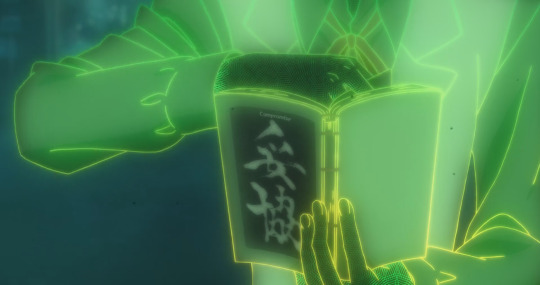
“the phantom’s notebook had the word Compromise written on the cover. A copy of himself that didn’t follow ideals but made compromises was an abomination to Kunikida.”
Considering how abilities act as the shadow to every character in this story, this is a nice detail that shows how Kunikida’s inner desire is to compromise, because carrying such heavy ideals is undoubtedly a burden. However, because he holds onto his ideals so strongly, it becomes his biggest weakness AND his biggest strength.
9. There’s a super small detail added to this scene with Dazai, Fyodor, and Shibusawa. When Dazai suggests that Shibusawa could be saved by an angel or a demon, the following exchange occurs:
“Hmm... Maybe an angel?” Dazai picked up the skull on the table. “Or maybe a demon?”
“It’s obvious what both of your true intentions are, if you ask me.” The third man mirthfully cackled and took the skull from Dazai’s hand.
In the movie, Dazai doesn’t pick up anything, so as a result Fyodor doesn’t take anything from Dazai either.
Because Fyodor walked into the scene after Dazai suggested that an angel or demon would save Shibusawa, I strongly suspect that this was foreshadowing future events in which Fyodor does “save” Shibusawa by giving him his memories back.
The novel adds more to this foreshadowing by having Dazai pick up the skull before it’s taken by Fyodor — essentially having Fyodor take the cards out of Dazai’s hands and put them in his favor.
It’s also worth pointing out that the skull is also the object that Fyodor uses to revive Shibusawa into a supernatural ghost of some sorts at the end of the story.
10. This may be just a difference in translations but in the movie, Shibusawa refers to Fyodor as “Demon Fyodor-kun”, whereas in the novel Fyodor is called “Fyodor the Conjurer.” (Ango uses the Conjurer title as well).
In western esotericism, a conjurer is a person who summons supernatural beings, like spirits, demons, or God.
This slightly changes the connotation of Fyodor’s title from a inhuman being of pure malicious intent to just a human who summons these otherworldly beings. This idea also aligns with Shibusawa’s revival, since he’s some sort of supernatural ghost that was “summoned” by Fyodor.
11. Skipping past the parts where Kyouka and Akutagawa regain their abilities, and Chuuya talks to Ango in the government facility, (since they have little to no changes between the movie and the novel) there is a somewhat significant detail changed in Draconia once again with Dazai and Fyodor.
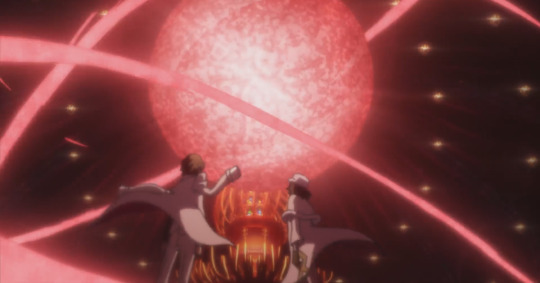
In the novel, this glowing ball of energy from the movie is actually described as an apple:
The two lights melted into one and spun until they formed a juicy sphere. They had produced a single apple — a juicy, poisoned apple red as blood.
It birthed a skill — and an extremely powerful one at that — the ability to absorb. Every last crystal adorning Draconia’s walls was sucked into the apple with intense force. Ten — a hundred — a thousand — two thousand — every last one was greedily devoured by the apple...
The apple swelled as it absorbed the numerous crystals until the red light became hotter than the surface of hell.
Since the “dead apple” motif aligns with Fyodor’s character, we can assume that the apple is representative of sin, and sin is associated with abilities, as Fyodor believes.
This strange poisoned apple is made of abilities and has an ability (the ability to absorb), and it commits a sin (greed) in its devouring of other abilities; it’s also hotter than “hell”, which is a very specific connection that leads me to this idea:
My theory is that a normal apple represents life, while a poisoned apple (or dead apple), indicative of a stained, impure life, represents sin. Fyodor believes abilities are akin to sin (what a clever rhyme), therefore all of their lives are sinful.
12. This is arguably the most insignificant change of this entire post, but I feel obligated to put it here regardless since it was different from the movie. When the Special Division detects the singularity of Shibusawa’s dragon form in the novel, it says:
“Abnormal values for singularity are increasing! They’re twice — no, 2.5 times higher than they were six years ago.”
In the movie, the number is five times higher instead.

Why did this number change? Is it significant? I honestly have no idea (I’m surprised I even caught this), but it’s there and I had to document it anyways.
13. The novel adds this narration for Shibusawa when he gets his memories back and he’s in the orphanage’s room with Atsushi:
“Shibusawa clearly recalled the events from six years ago. Fyodor had enticed him to go to the orphanage where he tortured a young Atsushi... until Atsushi fought back and killed him.”
There’s two things to take away from this: Fyodor had known Shibusawa for at least six years, and Fyodor had been planning the events of Dead Apple since at least six years ago.
I find it hard to believe that Fyodor’s plan was thwarted by Dazai, because of how Fyodor demonstrated his ability to plan ahead in the main series, but I’m not sure what the long term effects of this plan could be. If Shibusawa succeeded, then it could’ve aligned with the DOA’s goals, but once again I don’t think Fyodor’s plan was actually foiled.
14. Super minor once again, but right after Shibusawa gets revived, the last sentence of chapter 5 is,
“Nobody would ever see the smile on Fyodor’s face.”
Honestly, I think this was just added to create an ominous tone, but it’s a nice detail regardless.
15. As the red fog spreads across Yokohama, there’s a good part of exposition that connects the “dead apple” motif to Fyodor once again:
“After the red fog devoured the earth, the planet would undoubtedly look like a floating red apple from space. There would be no humans left on its surface, nor any signs they ever existed. It would be a true paradise, and with that, the Dead Apple would finally be complete. A dead planet covered in red fog — that was what Fyodor had planned and sought out.
Nothing other than death could wash away the original sin of man, so it was only fitting for the sin, which started with a fruit, to end with one as well.
It’s pretty long, but I like the way this passage is written, more specifically the last part since it fits well with the sinful poisoned apple idea.
It also aligns with Fyodor’s ideals of creating a true paradise, free of ability users. However, if Fyodor had planned to have the Earth covered in fog, that could mean that his plan was actually stopped by Dazai and Atsushi in the end.
16. Shibusawa has a few additional lines of dialogue when he talks to Atsushi in their final fight.
“The dragon and tiger... I see now why they are called rivals.”
The dragon and tiger have their roots in Chinese Buddhism, but to go further into that topic would make this already lengthy post even longer.
“Don’t get the wrong idea, though. I’m not blaming you for what happened.”
This line is a brief moment of weakness for Shibusawa, which is interesting in contrast to his strong will to kill Atsushi. Just as Atsushi learned to accept the past and the tiger’s ferocity, Shibusawa shares the same attitude by separating the blame from himself to just simply accepting the past for what happened.
17. In the aftermath of the last fight against Shibusawa, Atsushi and Kyouka meet up with Dazai.
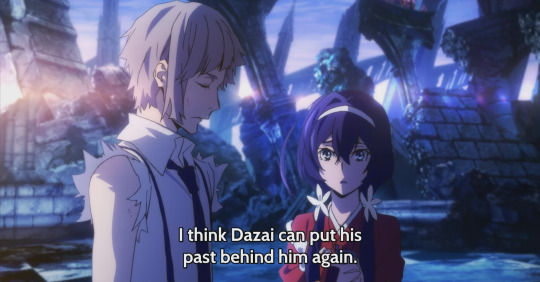
Kyouka asks, “Are you sure this is what you wanted?” which prompts two different responses in the movie and novel respectively.
In the movie, Atsushi says, “Just as Shibusawa was able to forget that he’d been killed before, I think Dazai can put his past behind him again. But this is fine.”
In the novel, Atsushi says:
“... I could probably seal away this memory just like how I’d forgotten I’d killed him before. But... I’m okay with this.”
I interpreted Kyouka’s question in the movie to be questioning Dazai’s loyalties, as he did betray everyone, and Atsushi responded in Dazai’s defense because he trusts him.
However, the novel does change Atsushi’s response to focus on himself rather than Dazai, which in turn changes the implications of Kyouka’s question.
Kyouka seems to be asking Atsushi whether he was okay with killing Shibusawa, and Atsushi responds by acknowledging that he did kill Shibusawa, and that’s okay. (a very clear development from the beginning of the story when he believed it was unnecessary to kill anyone, and he didn’t want to kill anyone)
18. In the epilogue, Ango talks about the underlying motivations behind the “Dead Apple” case. This change could be attributed to translation differences (like many others in this post), but the connotation does slightly differ from movie to novel.
In the movie, Ango says, “How is a man like Shibusawa, so intelligent that others look like alien creatures to him, to act, to be destroyed, or to be saved?”
In the novel, Ango says:
“Perhaps the two of them [Dazai and Fyodor] just wanted to get a glimpse of someone like them... Perhaps they wanted to see what he would do and how he would meet his demise... or perhaps how he would be saved.”
The movie simply poses a broad question of what would happen to Shibusawa, a person alienated from the rest of society.
The novel changes this to focus on Dazai and Fyodor’s perspective — two irredeemable aliens from society just like Shibusawa — executing this grand scheme out of curiosity to see what would happen to someone of the likes of them, and if there’s a possibility for redemption.
19. This is the final difference on this list, and it’s quite a large change. In Fyodor’s monologue at the very end of the story, he has a completely different tone from the movie to novel.
In the movie, Fyodor says, “But in order to end this world, rife with crime and punishment, I do need that book.”
The novel says:
Glittering high-rises and stately brick buildings stood side by side in this port city with its countless citizens who struggled against crime and punishment.
“I think I’ve taken a liking to this city myself..”
Fyodor took a bite of the apple in his hand, and the juicy nectar ran down his delicate fingers.
“You’d all better be on your best behavior until next time.”
The reference to the book may have been removed for consistency with the main series, as the book is a part of the DOA’s plan (or more specifically Fukuchi).
It also seems like Fyodor has grown fond of the city, and no longer wants Yokohama to be destroyed, so it’s still possible that his plan deterred from what he had originally intended.
Beyond that, I’m not entirely sure why crime and punishment was mentioned, or why there’s such an ominous tone to his ending statement, but that’s up to personal interpretation.
That concludes the long list of extremely specific and minor differences between the Dead Apple movie and light novel!
Overall, I would say it’s worth checking out the light novel if you don’t have a strong grasp of the Dead Apple story, because it definitely presents the small intricacies of the plot in a more comprehensible way.
On a side note, the manga adaptation has a lot of noticeable differences from the movie and light novel, mostly with the addition of entirely new scenes (which you can read @buraihatranslations — what a shameless self plug). I would highly recommend reading it as those extra scenes are very amusing, to say the least without giving any spoilers.
Honestly, this post was a lot longer than I intended, but I hope you enjoyed it regardless. Thank you for reading!
399 notes
·
View notes